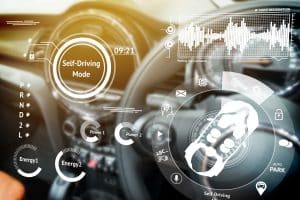Safe, Driverless Cars? We’re Not There Yet
 New cars come with a lot of bells and whistles, and many of them are safety related: back-up cameras that beep, lane assist technology that pings, forward collision warnings that ding. All of this tech is pretty noisy, but it is supposed to keep drivers safe and prevent crashes.
New cars come with a lot of bells and whistles, and many of them are safety related: back-up cameras that beep, lane assist technology that pings, forward collision warnings that ding. All of this tech is pretty noisy, but it is supposed to keep drivers safe and prevent crashes.
Do they actually work? No one seems to know. Much of the research says they could prevent accidents, or have the potential to reduce injuries, but the actual data is largely anecdotal. A 2018 study conducted by J.D. Power found that vehicle owners claimed their safety technologies prevented crashes; a study done the same year by the Insurance Institute for Highway Safety (IIHS) said relying on the tech alone would have caused more crashes, if people hadn’t intervened to stop them.
If the jury is still out on driver assistance technology reducing crashes, it makes sense to assume that actual autonomous cars may not be any safer – and the IIHS has said exactly that. AP News reports that a new IIHS study reviewed 5,000 crashes, focusing on those caused by driver errors such as incapacitation and “sensing and perceiving.” Out of those crashes, researchers found that driverless cars could only prevent accidents where the driver was drunk, drugged, or asleep behind the wheel.
When it comes to sensing and perceiving, however, the autonomous vehicles did not fare well. Per AP News, “robocars may not be able to prevent [other crash-causing mistakes], including prediction errors such as misjudging how fast another vehicle is traveling, planning errors including driving too fast for road conditions and execution errors including incorrect evasive maneuvers or other mistakes controlling vehicles.”
Should driverless cars act more like “people” on the road?
The argument in favor of autonomous vehicles points to how much safer they are than human drivers. If driver error accounts for 94% of all crashes, then eliminating the driver should reduce the number of wrecks by approximately the same number. The study, however, found that “computer-controlled robocars will only stop about one-third of” those crashes – a big number, but not nearly as many as expected.
Why? Because of those sensing and perception errors. Missy Cummings, a robotics and human factors professor at Duke University, told AP News that “preventing even one-third of the human-caused crashes is giving technology too much credit. Even vehicles with laser, radar and camera sensors don’t always perform flawlessly in all conditions, she said.” Humans, it turns out, are far better at recognizing potential obstacles and adjusting their driving accordingly.
That does not mean that driverless vehicles cannot be programmed to do the same; it is just that they’re not ready for that quite yet. This could present a significant problem when autonomous cars and human drivers share the road together.
Issues of liability for driverless cars
The laws in this country haven’t yet caught up to the technology, and we have some concerns when it comes to liability in a car wreck. Even now, with all the safety technology, a driver can’t blame a broken backup camera if he or she backs into a person or vehicle – but if his or her anti-lock brakes fail due to a defect, then the manufacturer can be held liable. What happens when the cars are fully autonomous, and they cause a wreck? Is it a defective product issue? A software issue? No one really knows.
North Dakota’s laws regulating autonomous vehicles don’t provide much clarity, either. Under North Dakota Century Code 39-01-01.2, “an individual using an autonomous vehicle is not driving or in actual physical control of the vehicle and, therefore, is exempt from licensing requirements if” certain conditions are met. However, per the law, “This section may not be construed to modify, limit, or restrict any statutory provision affecting liability.”
In other words, if you are in a driverless car, you are legally recognized as not being the driver – and yet you can still be held liable if your machine hurts or kills someone.
Autonomous vehicles may be the future, but they have a long way to go before they’re safe. For now, Larson Law will continue to do what it has always done: help North Dakota car crash victims get the justice and compensation they need. Please call 701-484-4878 or fill out our contact form to schedule a free consultation. We maintain offices in Minot and Bismarck.

Mark Larson is a Certified Civil Trial Specialist and Certified Civil Pre-Trial Specialist focusing on personal injury, car accidents, wrongful death, and oil field claims. Since 1979, Larson Law has served the injured throughout North Dakota. Read more about Mark V. Larson.
